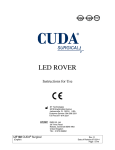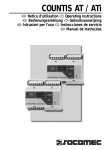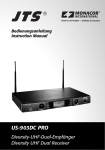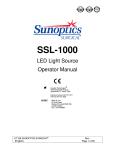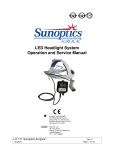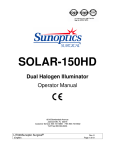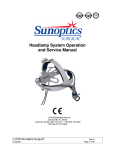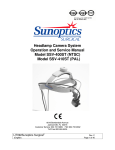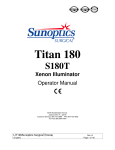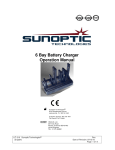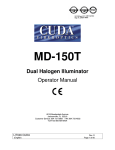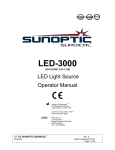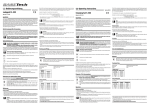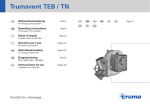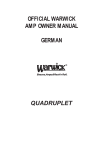Download LED ROVER - Sunoptics Surgical
Transcript
LED ROVER Instructions for Use ® Sunoptic Technologies 6018 Bowdendale Avenue Jacksonville, FL 32216 USA EC|REP RMS UK, Ltd. 28 Trinity Road Nailsea, Somerset BS48 4NU United Kingdom TEL: 01275 858891 LIT102 SUNOPTICS SURGICAL® (English) Rev. L Page 1 of 35 Table of Contents 1. INTRODUCTION 2. INTENDED USE/INDICATIONS FOR USE 3. WARNINGS/LABELING 4. SPECIFICATIONS 5. OPERATION 6. BATTERY INFORMATION 7. CLEANING/STERILIZATION 8. WARRANTY LIT102 SUNOPTICS SURGICAL® (English) Rev. L Page 2 of 35 1. INTRODUCTION The LED Rover is a Light Emitting Diode (LED) and battery unit to couple onto the light post of commercially available endoscopes having an ACMI or Wolf light post. The LED Rover is made to take the place of conventional light cable and remote light source. It couples to the endoscope in the same fashion as a conventional light cable by press fitting onto the endoscope’s light post. The LED Rover is powered by two lithium 3V, CR123 batteries (or interchangeable equivalents). The batteries power an LED via a current converter that supplies a constant current to the LED. The light is directed into the light post of the scope. The light is then carried by fiber optics internal to the scope to illuminate the target. 2. INTENDED USE / INDICATIONS FOR USE The LED Rover is used to illuminate the site of surgery during minimally invasive surgical procedures in arthroscopy (orthopedic surgery), laparoscopy (general and gynecological surgery) and in Endoscopy (general, gastroenterological and ENT surgery). The light is transmitted from the light source through a scope. 3. WARNINGS / LABELING 3.1 WARNINGS Battery powered equipment is considered unsuitable for use in the presence of flammable anesthetics. CAUTION The LED Rover is provided non-sterile. If used for sterile procedures, the unit must be sterilized or draped with commercially available surgical drapes. LIT102 SUNOPTICS SURGICAL® (English) Rev. L Page 3 of 35 CAUTION The LED Rover will become warm to the touch but even prolonged contact during use will not cause injury. CAUTION Avoid looking directly at the LED inside the port or pointing it directly at anyone’s eyes. The LED is painfully bright, can momentarily blind a person and will cause lingering ghost images. CAUTION Handle damaged or leaking batteries with care. Should you come in contact with the electrolyte, wash the exposed area with soap and water. Should the eye come in contact with the electrolyte, flush the eye with water for 15 minutes and seek medical attention. Do not incinerate discarded batteries. Follow local EPA requirements for proper disposal. 3.2 LABELING The LED Rover will be wrapped in bubble wrap and placed in the white box labeled as shown below. The device has no known contraindications. LIT102 SUNOPTICS SURGICAL® (English) Rev. L Page 4 of 35 4. SPECIFICATIONS Item Lamp Type Color temperature Lamp life Battery Current converter output Discharge time Model Dimensions Weight Electrical Protection Medical Classification Specification LED 6500° K (nominal) 50,000 hrs. (nominal) Lithium CR123, 3Volts (2X) or Lithium Ion RCR123A 3V (2X) 611 milliamps (nominal) 110 minutes (typical, actual endurance may vary) LED Rover 5.1 inches long X 1.25 inches diameter at LED housing 3.7 oz. Class I, Type BF FDA Class II Europe Class I 5. OPERATION The LED Rover is operated by a pushbutton switch inside a protective silicone rubber boot at the back end of the handle. It features a momentary ON function with partial depression of the switch, and clicks to stay ON with full depression. Depress the switch fully again to turn it off. 6. BATTERY INFORMATION 6.1 DISPOSABLE BATTERY MODEL BATTERY REPLACEMENT Unscrew the headpiece that houses the LED. (Do not remove the switch; the batteries cannot fit through the switch end.) Remove the old batteries and insert the new ones. Observe correct polarity. The positive (+) end of both batteries must point toward the headpiece. The positive end of the battery has a protruding nipple, the negative (-) end is flat. NOTE: Because discharge characteristics may vary between designations or between used and unused batteries, always replace batteries in pairs with pairs of identical new batteries. Replace disposable 3 volt Lithium CR123 primary batteries only with similar size and voltage batteries. Storage: Store in a dry area at 40º F – 85º F. 6.2 RECHARGEABLE BATTERY MODEL The rechargeable model lightsource differs from the standard only by the use of rechargeable batteries. The rechargeable batteries provided are a high capacity LIT102 SUNOPTICS SURGICAL® (English) Rev. L Page 5 of 35 “RCR123A” 3 volt Lithium-ion battery. The charger is compatible only with the 3 volt high capacity rechargeable Lithium-ion batteries. The 3 volt high capacity batteries provided are compatible only with chargers specifically designed for them. Do not put other types of batteries in the charger or attempt to charge the batteries with another type of charger. A pair of fully-discharged batteries will take approximately three hours to reach a full charge. The indicator light on the charging cradle will show green when the power converter powers the empty cradle. The indicator is red/orange when charging batteries and green when batteries are fully charged. Batteries may be “topped off” to full charge even if they are not discharged. Batteries may be left in the charging cradle when charged. (If the cradle is not powered, the indicator will show green if a battery with even a very low charge is inserted; the cradle must be powered for the indicator to be true.) It is advised to keep pairs of batteries together in use and in charging so that they both have approximately the same state of charge. Damage can result from mixing batteries of different charge strengths either in use or in charging. Avoid directly short circuiting a battery. The power converter operates on 100∼240 VAC, 50∼60Hz @ 0.5A. Fully charged batteries will operate the lightsource at full brightness for approximately 1½ hours, followed by approximately ½ hour of usable gradually diminishing light. 7. CLEANING / STERILIZATION 7.1 CLEANING The LED Rover is a high quality optical device. Care for it appropriately. A soft brush with mild detergent may be used to clean the device. The lens of the LED inside the optic port may be wiped with a swab. Avoid harsh or abrasive material that could scratch or in any way damage the optical surface. 7.2 STERILIZATION The LED Rover is provided non-sterile. The device should be cleaned and disinfected or sterilized prior to use, according to your institution’s requirements. CAUTION Do not reprocess the LED Rover using steam sterilization or autoclave. Use of these processes will result in damage to the instrument, and void its warranty. Process per your institution’s validated procedures and process parameters. Compatible Sterilization Method: STERRAD™ in STERRAD sterilizer. Double wrap with sterilization wrap. The full cycle of the Sterrad sterilizer comprises two identical exposure phases (6 minute injection, 2 minute diffusion and 2 minute plasma) preceded by a 10-minute pre-exposure plasma phase. LIT102 SUNOPTICS SURGICAL® (English) Rev. L Page 6 of 35 Follow the instructions provided with the STERRAD Sterilization System for sterilization processing via this equipment and method. NOTE: The LED Rover has a black anodized exterior finish which is affected by Sterrad sterilization. The black anodized finish gradually bleaches; however, this is irrelevant to the functionality of the unit. 8. LIMITED WARRANTY Your fiberoptic products(s) carry a 1-year warranty from the date of shipment on workmanship and all defects of material except batteries. Should your product prove to have such defects within one year from the date of shipment, Sunoptic Technologies® will repair or replace the product or component part without charge. Should your fiberoptic product(s) need servicing under this warranty, please contact Sunoptic Technologies® for return authorization documentation. You should carefully pack product in a sturdy carton and ship it to the factory. Please include a note describing the defects, your name, telephone number and a return address. Warranty does not cover equipment subject to misuse, accidental damage, and normal wear and tear. This warranty gives you specific legal rights and you may also have other rights that vary from state to state. • In the U.S call: 877 677-2832 (toll free) • FAX number: 904 733-4832 • Customer Service 904 737 7611 LIT102 SUNOPTICS SURGICAL® (English) Rev. L Page 7 of 35 LED ROVER Manuel d’instructions ® Sunoptic Technologies 6018 Bowdendale Avenue Jacksonville, FL 32216 USA EC|REP RMS UK, Ltd. 28 Trinity Road Nailsea, Somerset BS48 4NU United Kingdom TEL: 01275 858891 LIT102 SUNOPTICS SURGICAL® (French) Rév. L Page 8 de 35 Sommaire 1. INTRODUCTION 2. UTILISATION/INSTRUCTIONS D’UTILISATION 3. MISES EN GARDE / ÉTIQUETTAGE 4. SPECIFICATIONS 5. FONCTIONNEMENT 6. INFORMATION SUR LES PILES 7. NETTOYAGE/STÉRILISATION 8. GARANTIE LIT102 SUNOPTICS SURGICAL® (French) Rév. L Page 9 de 35 1. INTRODUCTION Le LED Rover est une diode électroluminescente (DEL) et une unité de batterie à coupler à la borne lumineuse des endoscopes commerciaux équipés d’une borne lumineuse ACMI de Wolf. Le LED Rover est destiné à remplacer le câble d’éclairage conventionnel et la source de lumière externe. Il se couple à l’endoscope de la même manière qu’un câble d’éclairage conventionnel, par raccord à pression sur la borne lumineuse de l’endoscope. Le LED Rover est alimenté par deux piles au lithium de 3V, CR123 (ou leur équivalent). Ces piles alimentent une DEL par le biais d’un convertisseur de courant qui fournit un courant continu à la DEL. Le faisceau de lumière est dirigé dans la borne d’éclairage de l’endoscope. Elle est ensuite transportée par les fibres optiques internes de l’endoscope pour éclairer la cible. 2. UTILISATION / INSTRUCTIONS D’UTILISATION Le LED Rover permet d’éclairer le site d’intervention lors de procédures chirurgicales peu invasives en arthroscopie (chirurgie orthopédique), laparoscopie (chirurgie générale et gynécologique) et endoscopie (chirurgie générale, gastro-entérologique et otorhinolaryngologique). La lumière est transmise depuis la source lumineuse à travers un endoscope. 3. MISES EN GARDE / ÉTIQUETTAGE 3.1 MISE EN GARDE Ce matériel alimenté par une pile ne doit pas être utilisé en présence de produits anesthésiants inflammables. ATTENTION Le LED Rover est livré non stérile. S’il est utilisé pour des procédures stériles, il doit être au préalable stérilisé ou entouré d’un drap chirurgical habituel. ATTENTION Le LED Rover devient chaud au toucher, mais même un contact prolongé en cours d’utilisation n’entraîne aucune blessure. LIT102 SUNOPTICS SURGICAL® (French) Rév. L Page 10 de 35 ATTENTION Évitez de regarder directement la DEL à l’intérieur du port et de la pointer directement dans les yeux. La DEL est très lumineuse, peut temporairement aveugler et favoriser l’apparition d’images résiduelles persistantes ATTENTION Maniez les piles endommagées ou présentant des coulures avec précaution. Si vous entrez en contact avec l’électrolyte, lavez la partie du corps exposée à l’eau savonneuse. En cas de contact avec les yeux, rincez les yeux sous l’eau courante pendant 15 minutes et consultez un médecin. Ne brûlez pas les piles usagées. Respectez les consignes d’élimination locales en vigueur pour vous débarrasser des piles usagées. 3.2 ÉTIQUETTAGE Le LED Rover est entouré dans du film à bulles d’air et placé dans la boîte blanche étiquetée comme illustré ci-dessous. L’appareil ne présente aucune contre-indication connue. LIT102 SUNOPTICS SURGICAL® (French) Rév. L Page 11 de 35 4. SPECIFICATIONS Article Type de lampe Température de couleur Durée de vie de la lampe Pile Spécification DEL 6500° K (nominal) 50 000 h. (nominal) Lithium CR123, 3Volts (2X) or Lithium Ion RCR123A 3V (2X) Sortie du convertisseur 611 milliampères (nominale) de courant Temps de décharge 110 minutes (typique, la durée effective peut varier) Modèle LED Rover, n° de pièce 41040.0004 Dimensions 5,1 pouces long X 1,25 pouce diamètre au logement de la DEL Poids 3.7 oz. Protection électrique Classe I, Type BF Classification médicale FDA Classe II Europe Classe I 6. FONCTIONNEMENT Le LED Rover est actionné par un bouton-poussoir situé à l’intérieur d’un manchon de protection en caoutchouc de silicone situé sur la partie arrière de la poignée. Actionnez ce bouton-poussoir à mi-course pour un fonctionnement momentané, et cliquez à fond pour un fonctionnement continu. Appuyez une nouvelle fois sur le bouton-poussoir pour arrêter l’appareil. 6. INFORMATION SUR LES PILES 6.1 MODÈLE DE PILE JETABLE REMPLACEMENT DES PILES Dévissez la partie de l’appareil abritant la DEL. (Ne retirez pas le commutateur ; les piles ne peuvent être insérées à travers l’extrémité du commutateur.) Retirez les piles usagées et insérez les piles neuves. Respectez ce faisant la polarité. L’extrémité positive (+) des deux piles doit être orientée vers la tête. L’extrémité positive des piles présente une légère bosse, tandis que l’extrémité négative (-) est plate. NOTE : Les caractéristiques de décharge pouvant varier entre les marques ou entre des piles usagées ou neuves, remplacez toujours les deux piles en même temps par de nouvelles piles identiques. Remplacez toujours les piles Lithium CR123 3 volts d’origine par des piles de même format et de tension. Stockage : Conservez l’appareil dans un local sec entre 4º C et 40º C. LIT102 SUNOPTICS SURGICAL® (French) Rév. L Page 12 de 35 6.2 MODÈLE DE PILE RECHARGEABLE La source lumineuse rechargeable ne diffère de la source standard que par l’utilisation de piles rechargeables. Les piles rechargeables fournies sont des piles lithium-ions de 3 volts RCR123A haute capacité. Le chargeur est compatible uniquement avec ces piles. Les piles 3 volts haute capacité fournies sont compatibles uniquement avec les chargeurs spécifiquement conçus à cette fin. N’utilisez pas d’autres types de piles dans le chargeur, et ne tentez pas de charger les piles avec un autre type de chargeur. Il faut environ trois heures à une paire de piles totalement déchargées pour atteindre leur niveau de charge complet. Le témoin situé sur le berceau de charge s’allume en vert lorsque le convertisseur électrique alimente le berceau. Il s’allume en rouge/orange en cours de charge des piles, et vert lorsque les piles sont entièrement chargées. Les piles peuvent être chargées « à bloc » même lorsqu’elles ne sont pas déchargées. Une fois chargées, elles peuvent demeurer dans le berceau de charge. (Si le berceau n’est pas sous tension, le témoin s’allume en vert si vous insérez une pile même très peu chargée ; le berceau doit être mis sous tension pour que l’affichage du témoin soit correct.) Il est recommandé de conserver les deux piles ensemble en cours d’utilisation comme lors de la charge, de manière à ce qu’elles présentent à peu près le même niveau de charge. Le fait de mélanger des piles de charges différentes lors de l’utilisation ou de la charge peut entraîner des dommages. Évitez de court-circuiter directement une pile. Le convertisseur de courant fonctionne sur 100∼240 V CA, 50∼60Hz @ 0,5A. Les piles entièrement chargées font fonctionner la source lumineuse à pleine puissance pendant environ 1,5 heure, puis pendant 0,5 heure avec une intensité de fonctionnement qui se réduit progressivement. 7. NETTOYAGE / STÉRILISATION 7.1 NETTOYAGE Le LED Rover est un appareil optique de très haute qualité. Il convient donc de l’entretenir en conséquence. Une brosse douce enduite d’un détergent doux peut être utilisée pour nettoyer l’appareil. La lentille de la DEL située à l’intérieur du port optique peut être essuyée avec un coton-tige. Évitez tout produit dur ou abrasif qui risquerait de rayer ou d’endommager la surface optique de quelque manière que ce soit. 7.2 STÉRILISATION Le LED Rover est livré non stérile. Il doit être nettoyé, désinfecté ou stérilisé avant d’être utilisé, en respectant les pratiques en vigueur dans le centre médical. LIT102 SUNOPTICS SURGICAL® (French) Rév. L Page 13 de 35 ATTENTION Ne traitez pas le LED Rover en utilisant une stérilisation à la vapeur ou un autoclave. Cela endommagerait l’appareil et annulerait la garantie. Procédez conformément aux procédures et aux paramètres de traitement en vigueur dans votre institution. Méthode de stérilisation compatible : STERRAD™ dans le stérilisateur STERRAD. Entourez de deux couches de matériau de stérilisation. Le cycle complet du stérilisateur Sterrad comprend deux phases d’exposition identiques (injection de 6 minutes, diffusion de 2 minutes et plasma de 2 minutes), précédées d’une phase de pré-exposition plasmatique de 10 minutes. Suivez les instructions fournies avec le système de stérilisation STERRAD pour procéder à la stérilisation en utilisant ce matériel et cette méthode. NOTE : Le LED Rover présente un fini extérieur noir anodisé qui est affecté par la stérilisation Sterrad. Ce fini disparaît progressivement, mais cela n’a strictement aucune incidence sur le fonctionnement de l’appareil. 8. GARANTIE Votre produit à fibres optiques dispose d’une garantie d’un an pièces et main d’œuvre à compter de la date d’envoi, qui ne couvre toutefois pas les piles. Si des problèmes devaient survenir sur votre appareil dans ce délai d’un an à compter de la date d’envoi, Sunoptic Technologies® répare ou remplace gratuitement le produit ou les composantes affectées. Si le produit à fibres optiques nécessite un entretien aux termes de cette garantie, veuillez contacter Sunoptic Technologies® pour obtenir les documents d’autorisation de renvoi. Emballez alors soigneusement le produit dans un carton rigide et renvoyez-le à l’usine. Veuillez joindre une note décrivant le défaut constaté, avec vos nom, numéro de téléphone et adresse de réexpédition. La garantie ne couvre pas les matériels utilisés de manière non conforme, les dommages accidentels ou la fatigue et l’usure normales. Cette garantie vous octroie des droits légaux spécifiques, qui peuvent être complétés par d’autres droits variant d’un État à l’autre. • Aux États-Unis, appelez le : 877 677-2832 (toll free) • Numéro de fax : 904 733-4832 • Service clientèle : 904 737 7611 LIT102 SUNOPTICS SURGICAL® (French) Rév. L Page 14 de 35 LED ROVER Gebrauchsanweisung ® Sunoptic Technologies 6018 Bowdendale Avenue Jacksonville, FL 32216 USA EC|REP RMS UK, Ltd. 28 Trinity Road Nailsea, Somerset BS48 4NU Großbritannien TEL.: 01275 858891 LIT102 SUNOPTICS SURGICAL® (German) Rev. L Seite 15 von 35 Inhaltsverzeichnis 1. EINLEITUNG 2. VERWENDUNGSZWECK / -HINWEISE 3. WARNUNGEN / BESCHRIFTUNGEN 4. SPEZIFIKATIONEN 5. BETRIEB 6. BATTERIE / AKKU 7. REINIGUNG / STERILISATION 8. GARANTIE LIT102 SUNOPTICS SURGICAL® (German) Rev. L Seite 16 von 35 1. EINLEITUNG Der LED Rover ist eine Leuchtdiode (LED) und Batterieeinheit für die Verbindung mit der Lichtsäule von handelsüblichen Endoskopen, die eine Lichtsäule ACMI von Wolf aufweisen. Der LED Rover ist dazu vorgesehen, die Stelle des konventionellen Lichtkabels und der entfernten Lichtquelle einzunehmen. Er wird mit dem Endoskop in derselben Weise wie ein konventionelles Lichtkabel durch eine Pressverbindung mit der Lichtsäule des Endoskops verbunden. Der LED Rover wird durch zwei Lithium 3V, CR123 Akkus (oder austauschbare Äquivalente) mit Energie versorgt. Die Akkus versorgen eine LED über einen Stromwandler mit Energie, der einen Konstantstrom an die LED liefert. Das Licht wird in die Lichtsäule des Endoskops geleitet und dann durch Glasfaseroptik intern zum Endoskop, um das Zielobjekt zu beleuchten. 2. VERWENDUNGSZWECK / -HINWEISE Der LED Rover wird verwendet, um die Operationsstelle während geringfügiger invasiver chirurgischer Eingriffe in der Arthroskopie (orthopädische Chirurgie), Bauchspiegelung (allgemeine und gynäkologische Chirurgie) und in der Endoskopie (allgemeine gastroenterologische und ENT-Chirurgie) zu beleuchten. Das Licht wird von der Lichtquelle durch ein Endoskop übertragen. 3. WARNUNGEN / BESCHRIFTUNG 3.1 WARNUNGEN Batteriebetriebene Ausrüstung wird als ungeeignet für die Verwendung in Gegenwart von brennbaren Anästhetika angesehen. WARNUNG Der LED Rover wird nichtsteril bereitgestellt. Bei Verwendung für sterile Verfahren muss die Einheit sterilisiert oder mit handelsüblichen Operationsabdecktüchern drapiert werden. LIT102 SUNOPTICS SURGICAL® (German) Rev. L Seite 17 von 35 WARNUNG Der LED Rover wird handwarm, aber sogar ausgedehnter Kontakt während der Verwendung ruft keine Verletzung hervor. WARNUNG Das direkte Schauen auf die LED im Inneren der Öffnung oder diese direkt auf jemandes Augen zu richten ist zu vermeiden. Die LED ist schmerzhaft hell, kann eine Person einen Augenblick lang blenden und ruft nachklingende Geisterbilder hervor. WARNUNG Beschädigte oder auslaufende Akkus mit Sorgfalt behandeln. Bei Kontakt mit dem Elektrolyt, den betroffenen Bereich mit Seife und Wasser waschen. Wenn das Auge mit dem Elektrolyt in Kontakt kommt, das Auge mit Wasser 15 Minuten lang spülen und einen Arzt aufsuchen. Entsorgte Akkus nicht verbrennen. Lokale EPAAnforderungen zur richtigen Entsorgung befolgen. 3.2 BESCHRIFTUNG Der LED Rover ist in Luftpolsterfolie eingewickelt und in einem weißen Kasten, der wie nachfolgend dargestellt beschriftet ist, platziert. Das Gerät hat keine bekannten Kontraindikationen. LIT102 SUNOPTICS SURGICAL® (German) Rev. L Seite 18 von 35 4. TECHNISCHE DATEN Position Lampentyp Farbtemperatur Lampenlebensdauer Akku Stromwandlerausgang Entladungszeit Modell Abmessungen Gewicht Elektrischer Schutz Medizinische Klassifizierung 5. Kennwert LED 6500 ° K (nominal) 50.000 Stunden. (nominal) Lithium CR123, 3Volts (2X) or Lithium Ion RCR123A 3V (2X) 611 Milliampere (nominal) 110 Minuten (typisch, tatsächliche Dauer kann variieren) LED Rover, Teilenummer 41040.0004 5,1 Zoll lang X 1,25-Zoll Durchmesser am LEDGehäuse 3,7 Unzen Klasse I, Typ BF FDA Klasse II Europa Klasse I BEDIENUNG Der LED Rover wird durch einen Druckknopftaster im Inneren einer schützenden Silikonkautschukmanschette am hinteren Ende des Handgriffs bedient. Er weist eine momentane EIN-Funktion bei teilweisem Niederdrücken des Schalters auf und rastet ein, um bei vollem Niederdrücken EIN zu bleiben. Den Schalter erneut vollständig niederdrücken, um auszuschalten. 6. BATTERIE / AKKU 6.1 MODELL MIT EINWEGBATTERIE BATTERIEAUSTAUSCH Das Oberteil, in dem die LED untergebracht ist, abschrauben. (Den Schalter nicht entfernen; die Batterien können nicht durch das Schalterende eingesetzt werden.) Die alten Batterien entfernen und die neuen einsetzen. Korrekte Polarität beachten. Das positive (+) Ende von beiden Batterien muss in Richtung des Oberteils zeigen. Das positive Ende der Batterie besitzt einen vorstehenden Ansatz, das negative (-) Ende ist flach. HINWEIS: Da die Entladungseigenschaften zwischen Marken oder zwischen gebrauchten und ungebrauchten Batterien schwanken können, die Batterien immer in Paaren mit Paaren von identischen neuen Batterien ersetzen. LIT102 SUNOPTICS SURGICAL® (German) Rev. L Seite 19 von 35 Die 3-Volt-Lithiumeinwegbatterien CR123 nur mit Batterien von gleicher Größe und Spannung ersetzen. Lagerung: In einem trockenen Bereich bei 40 º F - 85 º F lagern. 6.2 AKKU-MODELL Das wiederaufladbare Lichtquellen-Modell weicht vom Standard nur durch die Verwendung von Akkus ab. Die bereitgestellten Akkus sind "RCR123A" 3-VoltHochleistungs-Lithium-Ionen-Akkus. Das Batterieladegerät ist nur mit den wiederaufladbaren 3-Volt-Hochleistungs-Lithium-Ionen-Akkus kompatibel. Die bereitgestellten 3-Volt Hochleistungsakkus sind nur mit spezifisch dafür ausgelegten Batterieladegeräten kompatibel. Keine anderen Arten von Akkus in das Batterieladegerät einlegen oder versuchen die Akkus mit einem anderen Typ von Batterieladegerät zu laden. Ein Paar von vollständig entladenen Batterien benötigt etwa drei Stunden, um sich vollständig aufzuladen. Die Anzeigelampe an der Ladeschale leuchtet grün, wenn der Spannungsumformer die leere Schale versorgt. Die Anzeige ist bei der Aufladung von Akkus rot/orangefarben und grün, wenn die Akkus vollständig geladen sind. Die Akkus können voll aufgeladen werden, selbst wenn sie nicht entladen sind, und sie können in der Ladeschale verbleiben, nachdem sie aufgeladen sind. (Wenn die Schale nicht mit Energie versorgt wird, leuchtet die Anzeige grün, wenn ein Akku mit sogar sehr niedriger Ladung eingesetzt wird; die Schale muss mit Energie versorgt werden, damit die Anzeige gültig ist.) Es ist angeraten, Akkupaare zusammen zu verwenden und aufzuladen, sodass sie beide ungefähr denselben Ladezustand haben. Das Mischen von Akkus mit unterschiedlichen Ladungsstärken entweder bei der Verwendung oder beim Aufladen kann in einer Beschädigung resultieren. Das direkte Kurzschließen eines Akkus vermeiden. Der Spannungsumformer arbeitet mit 100∼240 VAC, 50∼60Hz @ 0,5A. Voll geladene Akkus betreiben die Lichtquelle bei voller Helligkeit für etwa 1 ½ Stunden, gefolgt von Annäherungsweise ½ Stunde nutzbarem allmählich abnehmendem Licht. 7. REINIGUNG / STERILISATION 7.1 REINIGUNG Der LED Rover ist ein hochwertiges optisches Gerät. Es ist entsprechend zu behandeln. Eine weiche Bürste mit mildem Reinigungsmittel verwenden, um das Gerät zu reinigen. Die Linse der LED im Inneren der optischen Öffnung kann man mit einem Tupfer abwischen. Hartes oder abrasives Material, das die optische Oberfläche zerkratzen oder auf irgendeine Weise beschädigen könnte ist zu vermeiden. 7.2 STERILISATION LIT102 SUNOPTICS SURGICAL® (German) Rev. L Seite 20 von 35 Der LED Rover wird nichtsteril geliefert. Das Gerät sollte gemäß den Anforderungen Ihres Instituts vor der Verwendung gereinigt und desinfiziert oder sterilisiert werden. WARNUNG Den LED Rover nicht unter Verwendung von Dampfsterilisation oder einem Autoklav wieder aufbereiten. Das Verwenden dieser Verfahren resultiert in einer Beschädigung des Instruments und lässt seine Garantie ungültig werden. Per den validierten Verfahren und Verfahrensparametern Ihres Institutes vorgehen. Kompatible Sterilisationsmethode: STERRAD™ im STERRAD-Sterilisator. Doppelte Verpackung mit Sterilisationsverpackung. Der gesamte Zyklus des Sterrad-Sterilisators umfasst zwei gleiche Expositionsphasen (6 Minuten Einspritzen, 2 Minuten Diffusion und 2 Minuten Plasma) denen eine 10minütige Vorexpositionsplasmaphase vorausgeht. Folgen Sie den Anleitungen des STERRAD-Sterilisierungssystems bezüglich dem Sterilisationsverfahren mit dieser Ausrüstung und Methode. HINWEIS: Der LED Rover hat ein schwarzes anodisiertes äußeres Finish, das durch die Sterrad-Desinfizierung beeinträchtigt wird. Das schwarze anodisierte Finish bleicht allmählich aus; dies ist jedoch für die Funktionalität der Einheit irrelevant. 8. BESCHRÄNKTE GARANTIE Die Fiberoptikprodukte haben eine 1-jährige Garantie vom Versanddatum auf die Verarbeitung und alle Materialmängel, ausgenommen Akkus. Wenn Ihr Produkt solche Mängel innerhalb eines Jahres vom Versanddatum aufweist, repariert oder ersetzt Sunoptic Technologies® das Produkt oder den Bestandteil kostenlos. Sollten Ihre Fiberoptikprodukte diese Garantie benötigen, kontaktieren Sie bitte Sunoptic Technologies® bezüglich der Warenrücksendegenehmigung. Das Produkt sollte sorgfältig in einem stabilen Karton eingepackt und an die Fabrik versendet werden. Fügen Sie bitte eine Notiz mit Angabe der Mängel, Ihres Namens, Ihrer Rufnummer und einer Rücksendeadresse bei. Die Garantie deckt keine Ausrüstung ab, die falschem Gebrauch, einem Unfallschaden und normalem Verschleiß unterliegt. Diese Garantie gibt Ihnen spezifische Rechtsansprüche und Sie können ebenfalls andere Rechte haben, die von Land zu Land variieren. • In der USA Tel.: 877 677-2832 (toll free) • Faxnummer: 904 733-4832 • Kundendienst: 904 737 7611 LIT102 SUNOPTICS SURGICAL® (German) Rev. L Seite 21 von 35 LED ROVER Istruzioni per l’uso ® Sunoptic Technologies 6018 Bowdendale Avenue Jacksonville, FL 32216 USA EC|REP RMS UK, Ltd. 28 Trinity Road Nailsea, Somerset BS48 4NU Regno Unito TEL: 01275 858891 LIT102 SUNOPTICS SURGICAL® (Italian) Rev. L Seite 22 von 35 Indice 1. INTRODUZIONE 2. DESTINAZIONE D’USO/INDICAZIONI PER L’USO 3. AVVERTENZE/ETICHETTATURA 4. SPECIFICHE TECNICHE 5. FUNZIONAMENTO 6. INFORMAZIONI SULLA BATTERIA 7. PULIZIA/STERILIZZAZIONE 8. GARANZIA LIT102 SUNOPTICS SURGICAL® (Italian) Rev. L Seite 23 von 35 1. INTRODUZIONE Il LED Rover è un LED e una batteria che si accoppiano alla luce degli endoscopi disponibili sul mercato dotati di una presa di luce ACMI di Wolf. Il LED Rover è realizzato per sostituire il cavo luce convenzionale e la sorgente di luce remota. Esso si abbina agli endoscopi allo stesso modo del cavo luce convenzionale montandolo sulla presa di luce dell’endoscopio. Il LED Rover è alimentato da due batterie CR123 al litio 3V (o equivalenti intercambiabili). Le batterie alimentano un LED attraverso un convertitore di corrente che fornisce corrente costante al LED. La luce è diretta alla presa di luce dell’endoscopio. La luce poi è condotta dalle fibre ottiche interne all’endoscopio per illuminare l’area interessata. 2. DESTINAZIONE D’USO / INDICAZIONI PER L’USO Il LED Rover è usato per illuminare l’area su cui intervenire durante interventi chirurgici minimamente invasivi in artroscopia (chirurgia ortopedica), laparoscopia (chirurgia generale e ginecologica) e in endoscopia (chirurgia generale, gastroenterologica e otorinolaringoiatra). La luce è trasmessa dalla sorgente di luce attraverso un endoscopio. 3. AVVERTENZE / ETICHETTATURA 3.1 AVVERTENZE Strumentazioni alimentate a batteria sono considerate non idonee all’uso in presenza di anestetici infiammabili ATTENZIONE Il LED Rover non è fornito come sterile. Se usato per interventi sterili, l’unità deve essere sterilizzata o coperta con coperture chirurgiche disponibili sul mercato. ATTENZIONE LIT102 SUNOPTICS SURGICAL® (Italian) Rev. L Seite 24 von 35 Il LED Rover diventerà caldo al tocco, nonostante ciò anche il contatto prolungato durante l'uso non causa infortuni. ATTENZIONE Evitare di fissare direttamente il LED all’interno dell’apertura o puntarlo direttamente negli occhi di qualcuno. Il LED è estremamente luminoso, può accecare temporaneamente una persona e causerà immagini fantasma persistenti. ATTENZIONE Maneggiare le batterie danneggiate o che presentano perdite con cura. Nel caso in cui si venga in contatto con gli elettroliti, lavare subito con sapone e acqua l’area esposta. Nel caso in cui gli occhi vengano in contatto con gli elettroliti, sciacquare gli occhi con acqua per 15 min. e consultare un medico. Non bruciare le batterie scariche. Seguire le normative locali per lo smaltimento. 3.2 ETICHETTATURA Il LED Rover sarà imballato in materiale di imballaggio con bolle d’aria e posto in una scatola bianca etichettata come indicato di seguito. L’apparecchiatura non ha controindicazioni conosciute. LIT102 SUNOPTICS SURGICAL® (Italian) Rev. L Seite 25 von 35 4. SPECIFICHE TECNICHE Elemento Tipo di lampada Temperatura colore Durata lampada Batteria Specifiche tecniche LED 6500° K (nominale) 50.000 ore (nominale) Lithium CR123, 3Volts (2X) or Lithium Ion RCR123A 3V (2X) convertitore 611 milliampere (nominale) Uscita corrente Tempo di scarica Modello Dimensioni Peso Protezione elettrica Classificazione medica 5. 110 min. (la durata attuale tipica può variare) LED Rover, Numero parte 41040.0004 5.1’’ x 1.25’’ diam. sull’alloggiamento LED 105 g. Classe I, Tipo BF FDA Classe II Europe Classe I FUNZIONAMENTO Il LED Rover funziona mediante un interruttore a pulsante all’interno di un rivestimento di silicone protettivo all’estremità dell'impugnatura. Si attiva temporaneamente con una pressione parziale dell'interruttore e permane attivo premendo completamente. Premere nuovamente l’interruttore per spegnere. 6. INFORMAZIONI SULLA BATTERIA 6.1 MODELLO DI BATTERIA SMALTIBILE SOSTITUZIONE BATTERIA Svitare la testata che ospita il LED. (Non rimuovere l’interruttore; le batterie non possono essere inserite attraverso l’estremità dell’interruttore.) Rimuovere le batterie scariche e inserire le nuove. Osservare la corretta polarità. Il terminale positivo (+) di entrambe le batterie deve essere rivolto verso la testata. L’estremità positiva della batteria ha un protuberanza, quella negativa (-) è piatta. NB: Poiché le caratteristiche di scarica possono variare a seconda delle designazioni o tra batterie usate e non usate, sostituire sempre le batterie a coppia con coppie di batterie identiche nuove. Sostituire le batterie CR123 al litio da 3 V smaltibili solo con batterie delle stesse dimensioni e dello stesso voltaggio. Conservazione: Conservare in un’area asciutta a 40º F – 85º F. 6.2 MODELLO DI BATTERIA RICARICABILE LIT102 SUNOPTICS SURGICAL® (Italian) Rev. L Seite 26 von 35 La sorgente di luce di tipo ricaricabile si differenzia da quella standard solo per l'uso di batterie ricaricabili. Le batterie ricaricabili in dotazione sono batterie agli ioni di litio da 3 V ad alta capacità di tipo “RCR123A”. Il caricabatteria è compatibile solo con le batterie agli ioni di litio ricaricabili da 3 V ad alta capacità. Le batterie da 3 V al alta capacità fornite sono compatibili solo con caricabatterie realizzati in modo specifico per questo tipo di batterie. Non mettere altri tipi di batterie nel caricabatteria o tentare di caricare le batterie con un altro tipo di caricabatteria. Una coppia di batterie completamente scariche impiegheranno circa tre ore per caricarsi completamente. La spia sul supporto da tavolo per la ricarica sarà verde quando il convertitore di potenza alimenta il supporto da tavolo per la ricarica vuoto. L’indicatore è rosso/arancione quando le batterie sono in ricarica e verde quando le batterie sono completamente cariche. Le batterie possono essere portate a piena carica anche se non sono scariche. Le batterie possono essere lasciate nel supporto da tavolo per la ricarica una volta caricate. (Se il supporto per la ricarica non è alimentato, la spia sarà verde se è inserita una batteria anche con una carica molto bassa; il supporto per la ricarica deve essere alimentato affinché la spia sia attendibile.) Si consiglia di usare e ricaricare insieme la coppia di batterie in modo tale che entrambe abbiamo lo stesso livello di ricarica Danni possono risultare dall’uso e dalla ricarica di batterie con diverso livello di carica. Evitare il corto circuito di una batteria. Il convertitore di potenza funziona a 100∼240 VAC, 50∼60Hz @ 0.5A. Le batterie completamente cariche faranno funzionare la sorgente di luce al massimo della luminosità per circa 1 ora e ½, seguita da circa ½ ora di uso con la luce che diminuisce gradualmente. 7. PULIZIA / STERILIZZAZIONE 7.1 PULIZIA Il LED Rover è un dispositivo ottico di alta qualità. Trattare con cura. Una spazzola morbida con detergente neutro può essere usata per pulire l’apparecchio. Le lenti del LED interne alla porta ottica possono essere pulite con uno strofinaccio. Evitare l’uso di materiale abrasivo o ruvido che potrebbe graffiare o in qualche modo danneggiare la superficie ottica. 7.2 STERILIZZAZIONE Il LED Rover non è fornito come sterile. L’apparecchio dovrebbe essere pulito e disinfettato o sterilizzato prima dell'uso, secondo quanto prescritto dalla vostra istituzione. LIT102 SUNOPTICS SURGICAL® (Italian) Rev. L Seite 27 von 35 ATTENZIONE Non riutilizzare il LED Rover usando sterilizzazione a vapore o autoclave. L’uso di queste procedure comporterà il danneggiamento dell’apparecchio e invaliderà la garanzia. Seguire le procedure di validazione della vostra istituzione e i parametri delle procedure. Metodo di sterilizzazione compatibile: STERRAD™ nello sterilizzatore STERRAD. Avvolgere a doppio strato nell’imballaggio per la sterilizzazione. Il ciclo completo dello sterilizzatore Sterrad comprende due identiche fase di esposizione (6 min. iniezione, 2 min. diffusione e 2 min. plasma) precedute da 10 min. di fase plasma pre-esposizione. Seguire le istruzioni fornite con il sistema di sterilizzazione STERRAD per la procedura di sterilizzazione mediante questo apparecchio e metodo. NB: Il LED Rover ha rifiniture esterne anodizzate nere che possono essere influenzate dalla sterilizzazione Sterrad. Le rifiniture anodizzate nere gradualmente si scoloriscono; tuttavia ciò non altera la funzionalità dell’unità. 8. GARANZIA LIMITATA I vostri prodotti a fibre ottiche sono forniti con una garanzia di 1 anno dalla data della spedizione sui difetti di produzione e materiali eccetto le batterie. Accertatasi che il vostro prodotto presenti difetti entro un anno dalla data di spedizione, la Sunoptic Technologies® riparerà o sostituirà il prodotto o componente senza alcun addebito. Nel caso in cui il vostro prodotto a fibre ottiche necessiti di assistenza coperta da questa garanzia, contatti Sunoptic Technologies® per ottenere la documentazione ne autorizzi la restituzione. Imballare con attenzione il prodotto in un cartone solido e inviarlo alla fabbrica. Includere una nota con descrizione dei difetti, il vostro nome, numero di telefono e indirizzo per la restituzione. La garanzia non copre apparecchiature soggette a uso non idoneo, danni accidentali e normale usura. Questa garanzia attribuisce diritti legali specifici e si potranno ottenere altri diritti che possono variare da paese a paese. • Per le chiamate dagli Stati Uniti: 877 677-2832 (toll free) • Numero Fax: 904 733-4832 • Servizio clienti: 904 737 7611 LIT102 SUNOPTICS SURGICAL® (Italian) Rev. L Seite 28 von 35 LED ROVER Instrucciones de utilización ® Sunoptic Technologies 6018 Bowdendale Avenue Jacksonville, FL 32216 EE.UU. REP|CE RMS UK, Ltd. 28 Trinity Road Nailsea, Somerset BS48 4NU Reino Unido TEL: 01275 858891 LIT102 SUNOPTICS SURGICAL® (Spanish) Rev. L Seite 29 von 35 Índice 1. INTRODUCCIÓN 2. UTILIZACIÓN PREVISTA/INDICACIONES DE UTILIZACIÓN 3. ADVERTENCIAS/ETIQUETAS 4. ESPECIFICACIONES 5. FUNCIONAMIENTO 6. INFORMACIÓN DE LAS PILAS 7. LIMPIEZA/ESTERILIZACIÓN 8. GARANTÍA LIT102 SUNOPTICS SURGICAL® (Spanish) Rev. L Seite 30 von 35 1. INTRODUCCIÓN El LED Rover es una unidad de diodo emisor de luz (LED) a pilas que se engancha a la lámpara de aquellos endoscopios disponibles en el mercado con una lámpara de ACMI de Wolf. El LED Rover está creado para sustituir a cables de iluminación y fuentes de iluminación remotas convencionales. Se engancha al endoscopio de la misma forma que un cable de iluminación convencional encajando el dispositivo en la lámpara de estilo del endoscopio. El LED Rover está alimentado por dos pilas de litio de 3V de tipo CR123 (u otras equivalentes intercambiables). Las pilas abastecen un LED a través de un convertidor de corriente que proporciona una corriente constante al LED. La luz se dirige hacia la lámpara del endoscopio. A continuación la luz es transmitida por la fibra óptica interna del endoscopio para iluminar la zona a operar. 2. UTILIZACIÓN PREVISTA/INDICACIONES DE UTILIZACIÓN El LED Rover se utiliza para iluminar la zona donde se va a practicar la operación durante procedimientos quirúrgicos mínimamente invasivos como artroscopias (operaciones ortopédicas), laparoscopias (operaciones generales y ginecológicas) y endoscopias (operaciones generales, gastroenterológicas y otorrinolaringológicas). La luz se transmite desde la lámpara a través de una esfera. 3. ADVERTENCIAS/ETIQUETAS 3.1 ADVERTENCIAS Los dispositivos que funcionan a pilas se consideran inadecuados para su utilización en presencia de anestésicos inflamables. PRECAUCIÓN El LED Rover se suministra sin esterilizar. Si se utiliza para procedimientos estériles, la unidad debe ser esterilizada o cubierta con paños quirúrgicos disponibles en el mercado. LIT102 SUNOPTICS SURGICAL® (Spanish) Rev. L Seite 31 von 35 PRECAUCIÓN El LED Rover se calentará pero incluso un contacto prolongado durante su utilización no provocará daños. PRECAUCIÓN Evite mirar directamente al LED del interior de la unidad o enfocarlo directamente a los ojos de alguien. El LED es muy luminoso, puede cegar momentáneamente a una persona y provocará visión borrosa. PRECAUCIÓN Maneje con cuidado las pilas dañadas o que presentan escapes. Si entrara en contacto con el electrolito, lave la zona expuesta con agua y jabón. Si sus ojos entraran en contacto con el electrolito, enjuáguelos con agua durante 15 minutos y consulte a un médico. No incinere las pilas gastadas. Siga las normativas de la EPA para deshacerse de las pilas. 3.2 ETIQUETAS El LED Rover estará envuelto en plástico con burbujas e irá colocado en una caja blanca con las etiquetas mostradas a continuación. El dispositivo no tiene contraindicaciones. LIT102 SUNOPTICS SURGICAL® (Spanish) Rev. L Seite 32 von 35 Elemento Tipo de lámpara Temperatura de color Vida de la lámpara Pila Especificación LED 6500° K (nominal) 50.000 h. (nominal) Lithium CR123, 3Volts (2X) or Lithium Ion RCR123A 3V (2X) Salida del convertidor de 611 miliamperios (nominal) corriente Tiempo de emisión 110 minutos (la resistencia típica real puede variar) Modelo LED Rover, Número de artículo 41040.0004 Dimensiones 5,1 pulgadas de largo X 1,25 pulgadas de diámetro en funda del LED (12,95 X 3,18 cm) Peso 3,7 onzas (104,89 g) Protección eléctrica Clase I, Tipo BF Clasificación médica FDA Clase II Europa Clase I 5. FUNCIONAMIENTO El LED Rover funciona accionando un botón situado en el interior de una funda protectora de silicona del extremo del mango. Incluye una función de encendido momentánea si se pulsa parcialmente el botón, y hace clic y se mantiene encendido si se pulsa totalmente. Vuelva a pulsar el botón para apagarlo. 6. INFORMACIÓN DE LAS PILAS 6.1 MODELO DE PILAS DESECHABLES CAMBIO DE LAS PILAS Desatornille el cabezal donde se aloja el LED. (No quite el botón; las pilas no entran por el extremo del interruptor.) Quite las pilas viejas e introduzca las nuevas. Siga la polaridad correcta. El extremo positivo (+) de las pilas debe estar dirigido hacia el cabezal. El extremo positivo de las pilas tiene una protuberancia, el extremo positivo (-) es liso. NOTA: Como las características de emisión pueden variar entre distintas marcas o entre pilas usadas y no usadas, cambie siempre las pilas de dos en dos por pares de pilas nuevas idénticas. Cambie las primeras pilas desechables de litio CR123 de 3 voltios únicamente por pilas de tamaño y voltaje similar. Almacenamiento: Guárdelo en una área seca a 40ºF - 85ºF (4ºC - 30ºC) LIT102 SUNOPTICS SURGICAL® (Spanish) Rev. L Seite 33 von 35 6.2 MODELO DE PILAS RECARGABLES La lámpara de modelo recargable se diferencia de la estándar únicamente por la utilización de pilas recargables. Las pilas recargables proporcionadas son pilas de ión de litio de alta capacidad “RCR123A” de 3 voltios. El cargador es compatible únicamente con pilas recargables de ión de litio de alta capacidad de 3 voltios. Las pilas de alta capacidad de 3 voltios proporcionadas son compatibles únicamente con cargadores especialmente diseñados para ellas. No meta otro tipo de pilas en el cargador ni intente cambiar las pilas con otro tipo de cargador. Dos pilas totalmente descargadas tardarán más o menos tres horas en cargarse por completo. El indicador luminoso del cargador se iluminará en verde cuando el convertidor de potencia abastezca al cargador. El indicador está rojo/naranja cuando se están cargando las pilas y verde cuando las pilas estén totalmente cargadas. Las pilas pueden cargarse completamente aunque no se hayan descargado anteriormente. Las pilas pueden dejarse en el cargador una vez cargadas. (Si el cargador no está conectado a la toma eléctrica, el indicador se iluminará en verde aunque la pila tenga muy poca carga; el cargador debe ser conectado a la toma eléctrica para que el indicador muestre la información real.) Es recomendable guardar juntos los pares de pilas cuando estén siendo utilizados y cargados para que tengan aproximadamente el mismo nivel de carga. Pueden producirse daños al mezclar pilas con distintos niveles de carga ya sea en el momento de la utilización o de la carga. Evite provocar un cortocircuito directamente sobre una pila. El convertidor de potencia funciona con 100∼240 VAC, 50∼60Hz a 0,5A. Las pilas completamente cargadas harán que la lámpara luzca con su máximo resplandor durante aproximadamente 1½ horas, seguidas de aproximadamente ½ hora de luz utilizable que se va reduciendo poco a poco. 7. LIMPIEZA/ESTERILIZACIÓN 7.1 LIMPIEZA El LED Rover es un dispositivo óptico de alta calidad. adecuadamente. Cuídelo Puede utilizar un cepillo blando con detergente suave para limpiar el dispositivo. La lente del LED ubicada en el interior del puerto óptico puede limpiarse con un hisopo húmedo. Evite aquellos materiales duros o abrasivos que puedan rayar o dañar de otra forma la superficie óptica. 7.2 ESTERILIZACIÓN El LED Rover se suministra sin esterilizar. El dispositivo debería ser limpiado y desinfectado o esterilizado antes de utilizarlo, siguiendo las normativas de su institución. LIT102 SUNOPTICS SURGICAL® (Spanish) Rev. L Seite 34 von 35 PRECAUCIÓN No procese el LED Rover utilizando esterilización por vapor o autoclave. Utilizar estos procesos provocará daños en el instrumento e invalidará la garantía. Procéselo siguiendo los procedimientos parámetros de proceso validados por su institución. Método de esterilización compatible: STERRAD™ en esterilizador STERRAD. Envuélvalo con dos capas de envoltorio de esterilización. El ciclo completo del esterilizador Sterrad consta de dos fases de exposición idénticas (inyección de 6 minutos, difusión de 2 minutos y plasma de 2 minutos) precedidas por 10 minutos de fase de plasma de preexposición. Siga las instrucciones proporcionadas con el Sistema de Esterilización STERRAD para procesar la esterilización con este equipamiento y este método. NOTA: El LED Rover tiene un acabado exterior anodizado de color negro que se ve afectado por la esterilización con Sterrad. El acabado negro anodizado se va aclarando poco a poco; sin embargo, esto no afecta a la funcionalidad de la unidad. 8. GARANTÍA LIMITADA Sus productos de fibra óptica tienen un año de garantía desde la fecha de envío que cubre todos los defectos de fabricación y materiales, a excepción de los defectos de las pilas. Si su producto presentara defectos semejantes en el año posterior a la fecha de envío, Sunoptic Technologies® reparará o sustituirá el producto o el componente sin cargo alguno. Por favor, si sus productos de fibra óptica necesitaran ser reparados de conformidad con la presente garantía, póngase en contacto con Sunoptic Technologies® para recibir la documentación de autorización de la devolución. Debería empaquetar cuidadosamente el producto dentro de una caja de cartón resistente y mandarlo a la fábrica. Por favor, incluya una nota que describa los defectos del producto, su nombre, número de teléfono y la dirección a la que desea que le enviemos en producto. La garantía no cubre aquel equipamiento que se haya visto sujeto a una mala utilización, daños accidentales, y al desgaste habitual. La presente garantía le concede derechos legales específicos y también puede tener otros derechos que varíen de un estado a otro. • En EE.UU. llame a: 877 677-2832 (toll free) • Número de FAX: 904 733-4832 • Atención al Cliente: 904 737 7611 LIT102 SUNOPTICS SURGICAL® (Spanish) Rev. L Seite 35 von 35



































